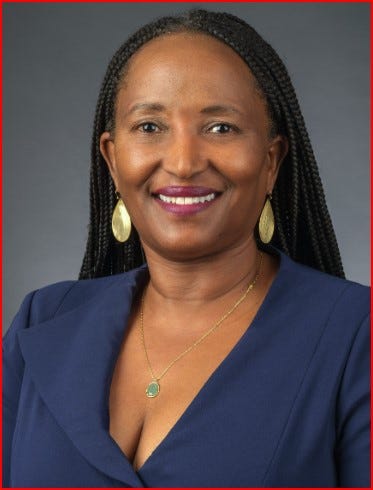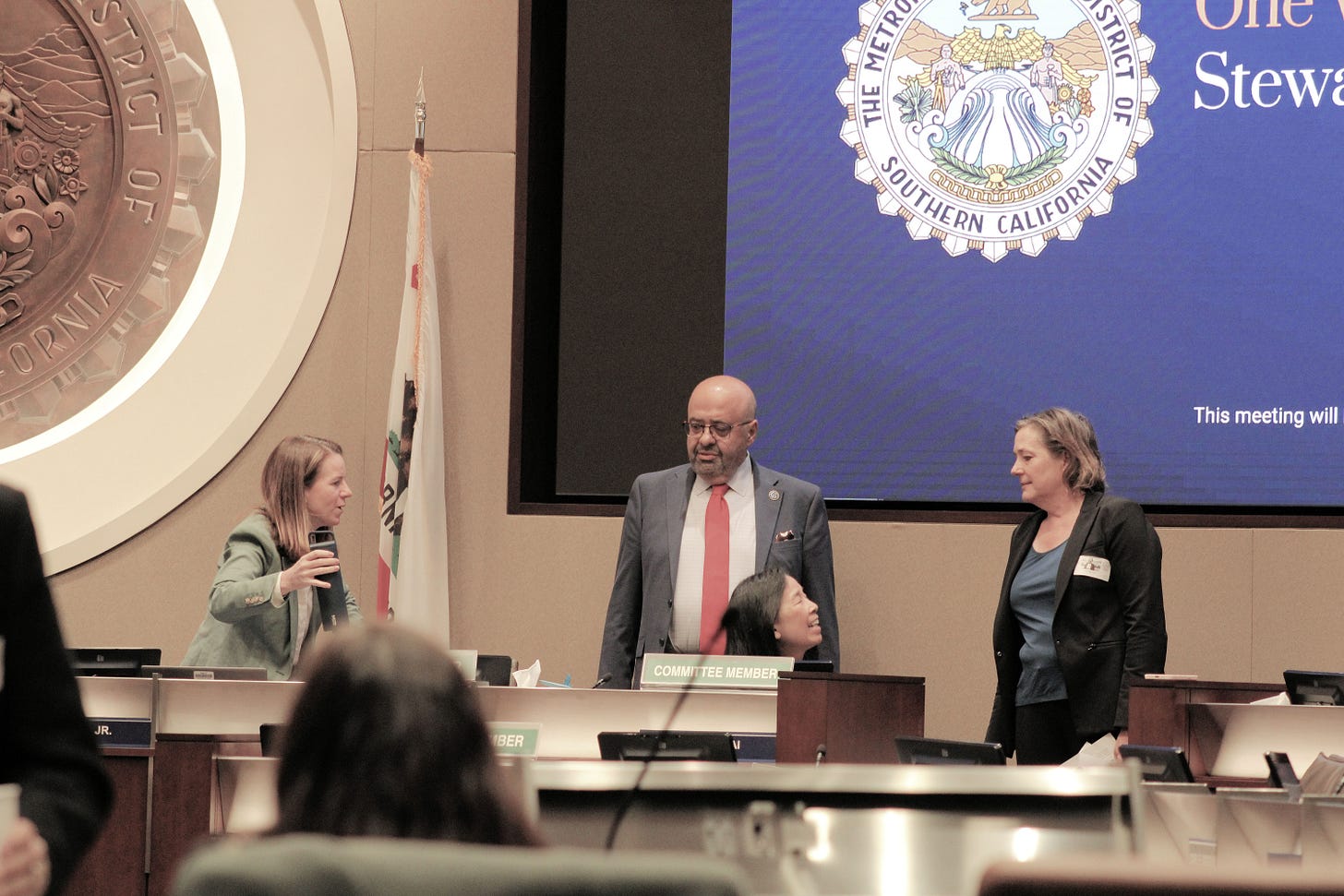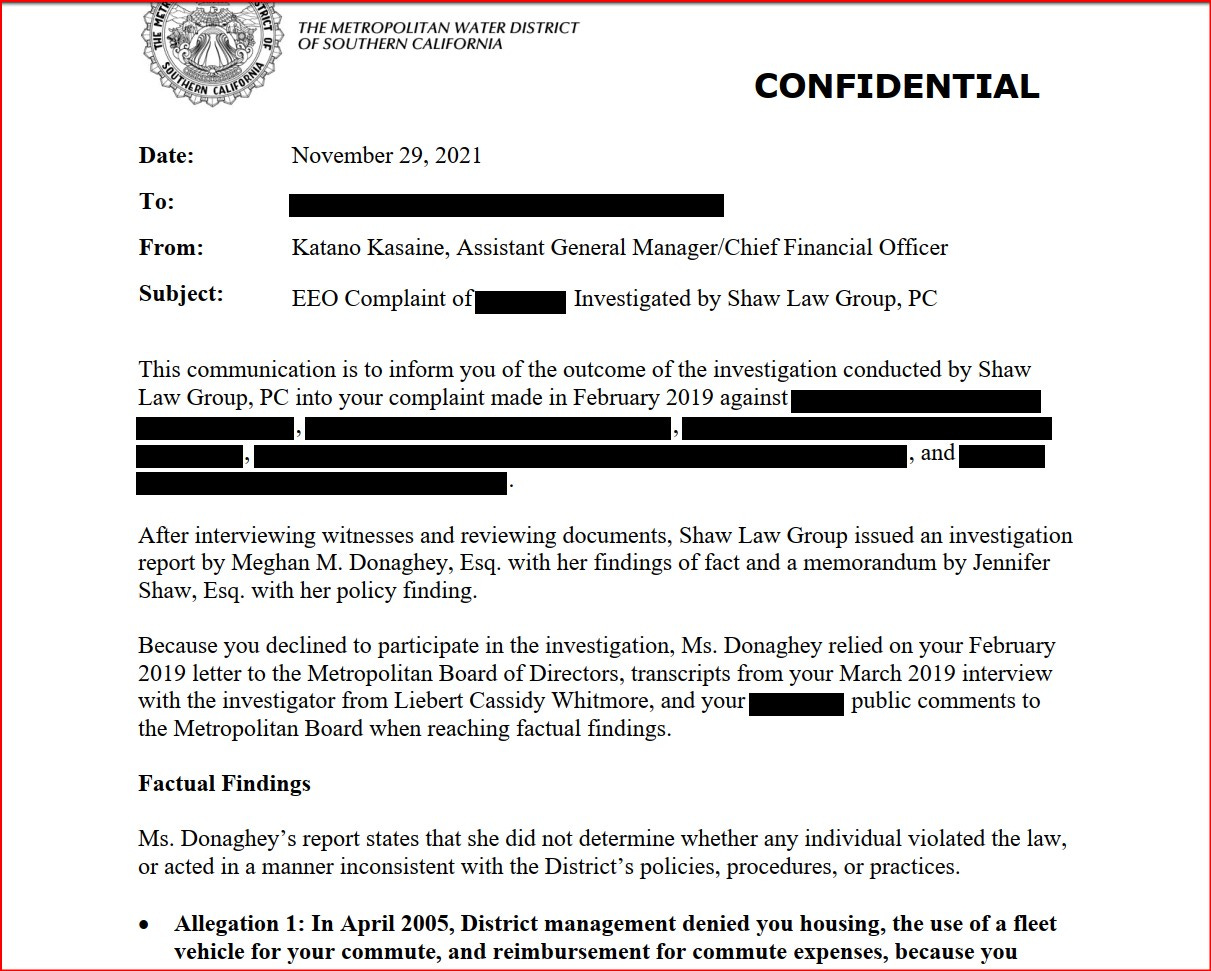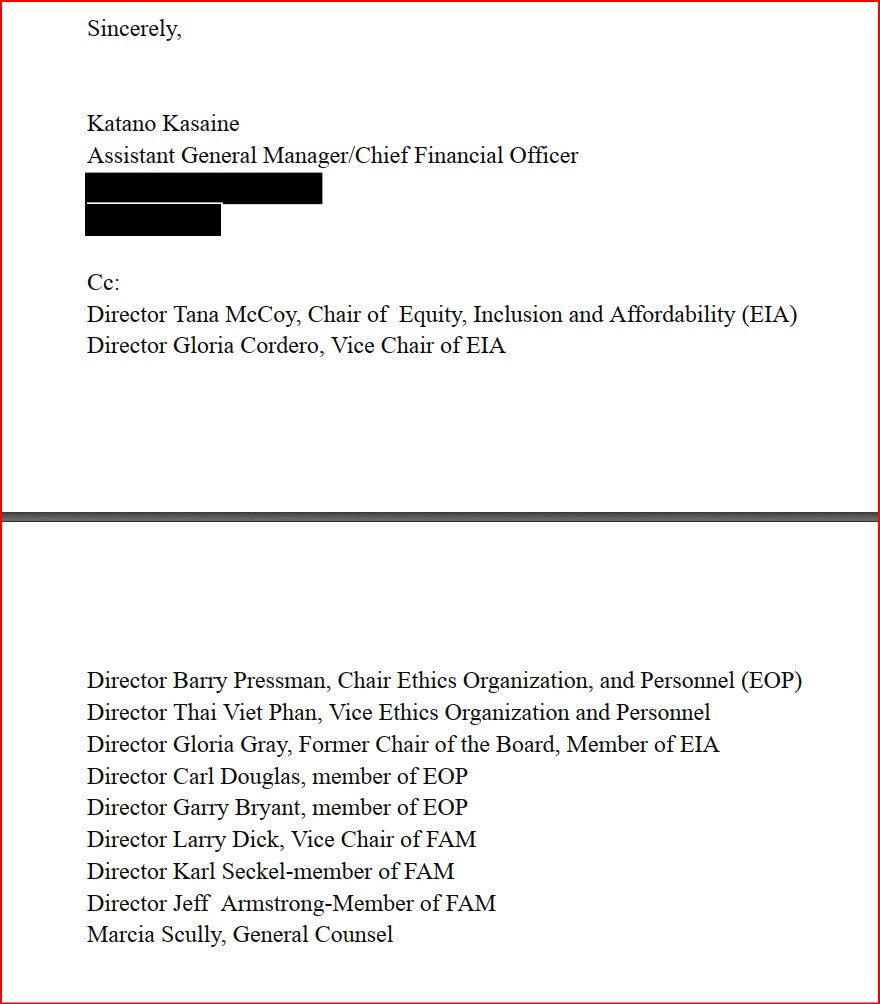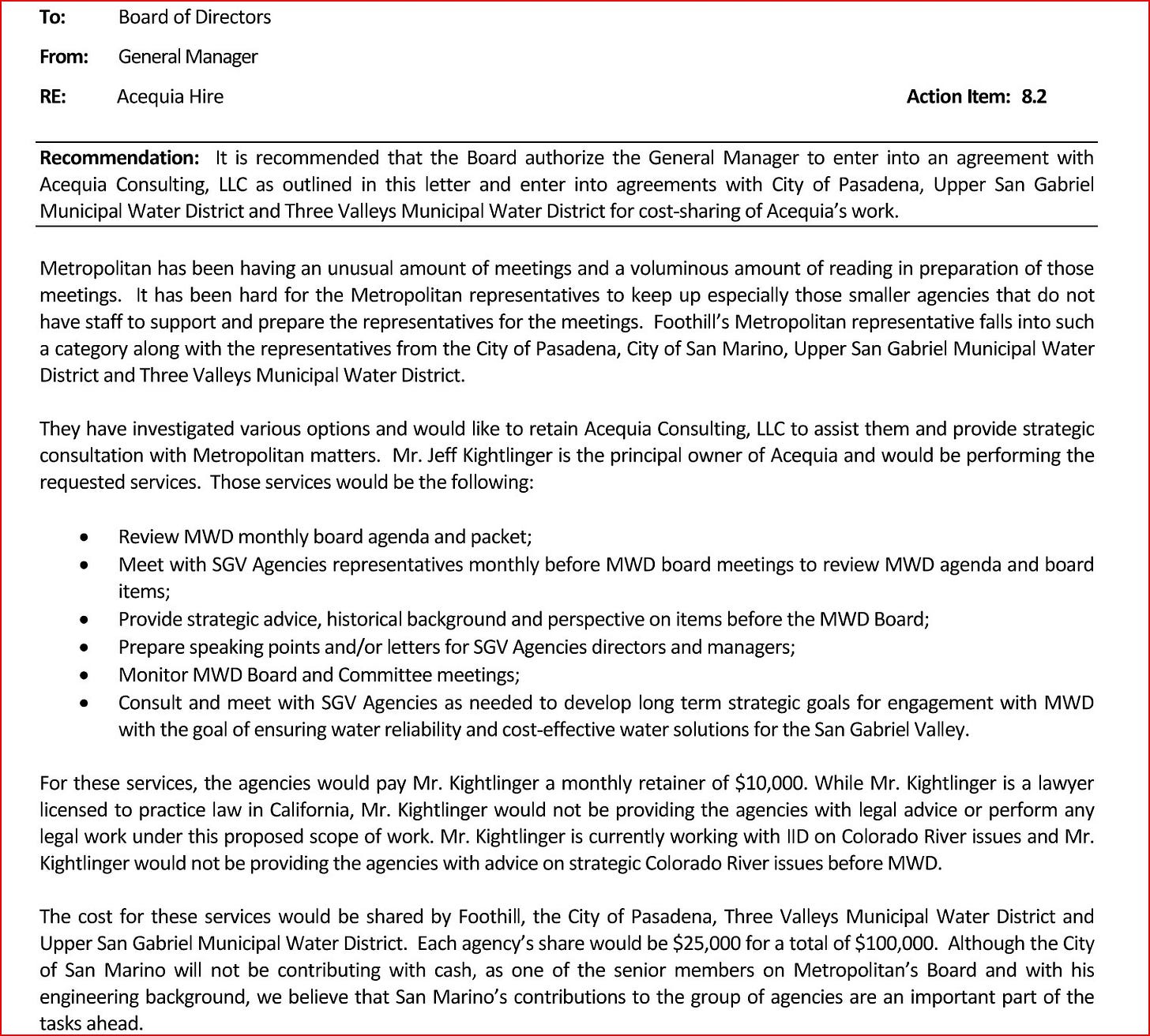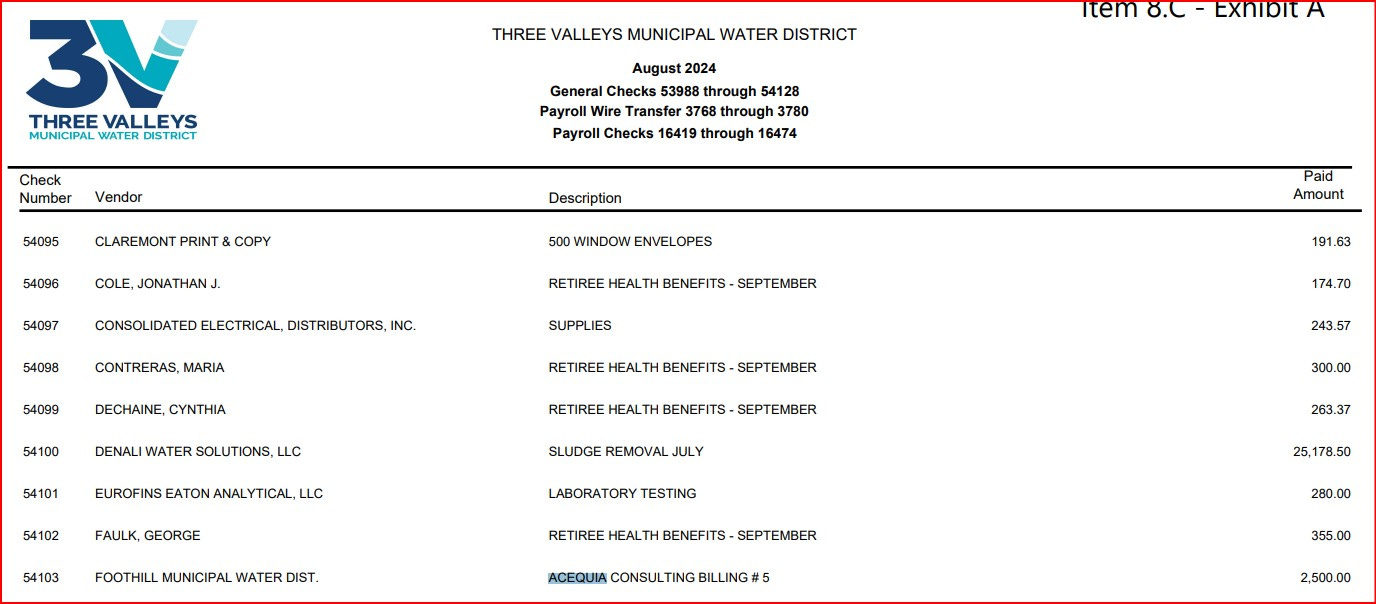Metropolitan Water leakers revealed
MWD's Assistant GM and Board Chair breached the agency's Admin Code and due process to handle harassment complaint against GM Adel Hagekhalil.
On October 28, I began exploring the due process—or lack thereof—concerning the investigation of Adel Hagekhalil, General Manager of the Metropolitan Water District of Southern California, for alleged workplace harassment and discrimination.
I emphasized that safeguarding the confidentiality of all parties involved is essential for ensuring a fair and impartial investigation. This protection is not only a matter of due process but also mandated by state law and Metropolitan’s Administrative Code.
The accusations that led to the investigation were made in a dramatic 14-page complaint by Metropolitan’s Assistant General Manager and CFO, Katano Kasaine, dated May 27. Her complaint is against her boss, GM Hagekhalil.
In response to AGM Kasaine’s complaint, Metropolitan’s Board of Directors, in a surprise vote on June 13, while GM Hagekhalil was out of the country, decided to place him on administrative leave pending the results of an investigation by an outside law firm.
On June 12, just one day before the vote, AGM Kasaine’s complaint was published online by Politico, one of America's most popular political journals. It’s clear that someone, likely from within Metropolitan, illegally leaked the complaint to Politico. The publication's reporters and editors seemed more focused on attracting readers than on respecting due process rights.
Opposing biases
Conducting a fair investigation that leads to just solutions requires controlling for biases that could influence the investigation from the outset.
However, long before June 12, AGM Kasaine’s entire complaint had already been knowingly leaked to 38 members of Metropolitan’s Board of Directors. This leak occurred before any investigation had been completed as prescribed by law.
The board members who received the unredacted document were already deeply divided over future water-supply plans for the agency’s 19 million Southern California customers, especially during this era of extreme climate change.
GM Hagekhalil and AGM Kasaine represent opposing sides in a long-standing ideological struggle between the new guard and old guard. The main point of contention revolves around whether to support Gov. Gavin Newsom’s Delta Conveyance Project and a greater reliance on imported water, or to emphasize more conservation and the development of local and regional supplies.
GM Hagekhalil downplays the Delta Conveyance Project (DCP), instead advocating for the creation of a “fourth aqueduct” through conservation, wastewater recycling, groundwater storage, and stormwater capture.
GM Hagekhalil’s immediate predecessor, Jeffrey Kightlinger, was a strong advocate for the Delta Conveyance Project (DCP). AGM Kasaine, who worked under Kightlinger for two years, currently serves as the treasurer of the Delta Conveyance Design and Construction Authority, a joint powers authority representing sixteen water agencies committed to building the DCP.
GM Hagekhalil was hired in June 2021 by a razor-thin vote of the Board of Directors to lead the new guard, focusing not only on water-management reform but also on changing a culture of discrimination and harassment that had persisted during Kightlinger’s 15-year tenure.
Hagekhalil swiftly tackled Kightlinger’s shortcomings by implementing a series of reforms for handling worker complaints and improving workplace culture, as recommended in a recent State Audit—an achievement that might be perceived as a rebuke to his predecessor.
AGM Kasaine’s complaint alleges that, in her last year and a half at Metropolitan, she endured the most “hostile and dysfunctional” workplace she had ever experienced. She attributes this to GM Hagekhalil’s management style, which she claims included cronyism and incompetence. Kasaine blames her trauma on constant scrutiny, discrimination, and retaliation by Hagekhalil for “standing up against issues that are not in MWD’s [Metropolitan’s] best interest.”
This leak, by all accounts, weakened due process rights of both the accused, GM Hagekhalil, and the accuser, AGM Katano Kasaine. My article posed the question, "Who leaked the 'confidential' complaint against Metropolitan’s GM to Politico?"
The question was both rhetorical and substantive. I do not know the name of the last link in the chain of leakers who handed the confidential and explosive complaint to Politico.
However, I do know the names of those who “set in motion a narrative that is potentially harmful to the general manager, the chief financial officer, this board, and this agency,” as described by Board Chair Adán Ortega. He characterized this illegal and unethical act but incorrectly attributed it to a single perpetrator.
I promised to reveal those names.
First leaker’s name is revealed
In hindsight, the identities of the perpetrators shouldn't surprise anyone who has followed the AGM Kasaine vs. GM Hagekhalil saga. However, it's understandable if some observers missed what was right in front of them, given the sheer cunning of the perpetrators.
In chronological order, the first known leaker is Metropolitan’s Assistant General Manager and CFO, Katano Kasaine.
Here’s what happened. AGM Katano Kasaine’s complaint against GM Hagekhalil was handled outside of regular procedures, an illicit process that appears on the surface to have been initiated by Kasaine.
Metropolitan’s procedure for processing Equal Employment Opportunity (EEO) complaints are codified in MWD’s Administrative Code, which was updated in March 2024.
In July 2022, Gloria D. Gray, Chairwoman of the board at that time, and GM Adel Hagekhalil, explained Metropolitan’s concept of confidentiality in a letter to “All Metropolitan Employees.”
The letter noted that the Board of Directors requested to review confidential—but completed—investigation reports by the independent Shaw Law Group regarding EEO complaints made by four employees, involving 16 allegations, to determine their suitability for public disclosure. It also highlighted that “only the Board can formally waive attorney-client privilege on these reports” and that, on July 12, it voted not to, citing a concern for balancing transparency with the privacy rights of employees.
“In addition to protecting individual privacy rights,” the letter explained, “this allows all persons who participate in an EEO investigation to trust in the integrity of the process and be protected from potential retaliation.”
The summary findings of the four investigations completed by the Shaw Group were reported publicly with redactions. However, copies of the actual documents, containing more details, obtained through a recent Public Records Act request, show that AGM Kasaine was responsible for delivering the details of those findings to each of the complainants.
Metropolitan’s Administrative Code outlines how EEO investigations should proceed. The first step is for the aggrieved employee to file a complaint with the EEO Officer, who reports to the General Manager.
If the General Manager—in this case, Hagekhalil—is the object of the complaint, it is directed to the independent Ethics Officer, currently Abel Salinas, who will retain an outside investigator. Confidentiality must be maintained throughout the process, except in instances where doing so would block the investigation.
Established by state law in 1999, the Ethics Office operates as an independent entity and protects the confidentiality of sources and the job security of whistleblowers, while providing due process for the accused. - Metropolitan Water District of Southern California
If the Ethics Officer has a conflict of interest, the complaint is redirected to the Legal Counsel, who then retains an external investigator. The substantiated findings of the investigation are presented to an Ad Hoc sub-committee chosen by the Executive Committee of the Metropolitan Board. This Ad Hoc committee reviews the evidence and makes recommendations for appropriate action to the Board.
According to Metropolitan’s rules, to avoid any conflict of interest, AGM Kasaine should have submitted her complaint to the Ethics Officer, not the EEO officer who reports to the General Manager—the object of her complaint in this case.
Instead of following procedure, AGM Kasaine addressed her 14-page complaint against GM Hagekhalil, dated May 27, to Board Chair Adán Ortega, copying Marcia Scully, General Counsel, and 10 members of the board.
As the assistant general manager and CFO for Metropolitan, Katano Kasaine is well aware of the the laws and rules applicable to workplace investigations, it is safe to assume. She must also be well are of the political shades within the organization, especially for the Board of Directors.
It’s doubtful, then, that she randomly selected the recipients of her 14-page complaint. One could reasonably assume that her choices were meant to put her case in a position of political advantage. Her letter was addressed directly to Chair Adán Ortega. The ten other directors she ccd are a mixed group, some of whom could be counted as Hagekhalil supporters and others as opponents (see the photo below).
Conflicts of interest
One of Kasaine’s picks, Director Garry Bryant, has at least an ethical conflict of interest in that the water agency he represents, Foothill Municipal Water District, is paying former Metropolitan GM Jeffrey Kightlinger, who owns the consulting firm Acequia, to assist and “provide strategic consultation with Metropolitan matters.”
Foothill is joined in the contract for the same services with Upper San Gabriel Municipal Water District, City of Pasadena and Three Valleys Municipal Water District, all of which will share equally in the cost. Kightlinger will be paid a monthly retainer of $10,000 a month for a total of $100,000 or $25,000 per agency total over the course of the contract.
Kightlinger will provide consulting services for a fifth water agency represented on the Metropolitan board, San Marino Municipal Water District, but its share of the cost is covered by the other four agencies. Based on public records, the contract has been in effect at least since May, 2024.
Representing those districts were the following directors who have voting power to help decide the fate of the case of Kasaine vs. Hagekhalil:
Garry Bryant, Foothill MWD
Anthony Follow, Upper San Gabriel Valley MWD
Cynthia Kurtz, City of Pasadena
David D. De Jesus, Three Valleys MWD
John T. Morris, San Marino MWD
A short time after Kasaine delivered her complaint to Board Chair Adán Ortega, probably in closed session of the June 11 meeting of the Ethics, Organization, and Personnel Committee, all 38 board members had received the meant-to-be-confidential complaint.
No comment and comment
Jeffrey Kightlinger did not respond to my request for comment.
Adán Ortega’s press officer responded on his behalf to my questions about the apparent conflict of interest held by the five water agencies that signed a contract with Kightlinger. Below is a copy of that email exchange.
Questions: Were the Board Chair and Legal Counsel aware of this ethical and possibly legal conflict of interest held by board members representing those five agencies at MWD board meetings, who have voted and will potentially vote on the matter of Kasaine vs. Hagekhalil? If so, what steps, if any, have been taken to eliminate the noted conflict of interest? If you don't consider the contract to be an ethical or legal conflict, can you explain your reasons for coming to that conclusion?
Answers: All discussion by Metropolitan’s Board of Directors about the investigation into personnel matters involving General Manager Hagekhalil has happened in closed session. Any unauthorized discussion of these matters with outside parties would be a violation of these closed session rules and may violate the privacy rights of all those involved. If someone suspects closed session confidentiality has been violated, they can file a complaint to Metropolitan’s Legal or Ethics offices.
Allegations of conflicts of interest can be made to Metropolitan’s Ethics Office.
Kasaine did not respond to emails asking her to explain why she circumvented normal reporting procedure to make her complaint against GM Hagekhalil.
But Adán Ortega, Chair of the Board and the other verified leaker, did respond, through his press officer, to my questions about Kasaine’s failure to follow established procedure in submitting her complaint against GM Hagekhalil. He also explained why he forwarded AGM Kasaine’s confidential complaint to the entire Metropolitan Board of Directors. His answer was astounding.
After that, a look at leaks to LA City Watch and a closer look at Metropolitan board members’ ambiguous commitment to fair and impartial investigations.
Editor’s note: This story was edited to remove the stated date for posting Chair Ortega’s official response on a date that now has passed. The Chair’s response will be posted, in full, at the end of a more practical sequence of stories related to AGM Katano Kasaine vs. GM Adel Hagekhalil.




